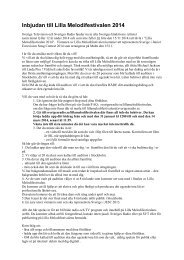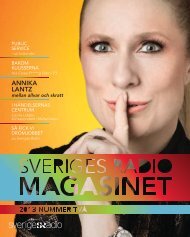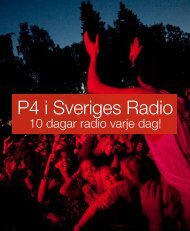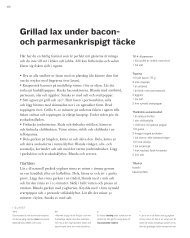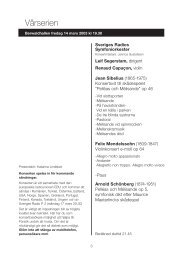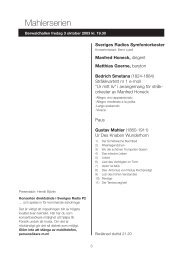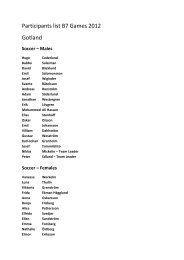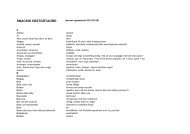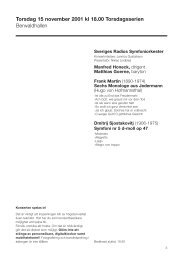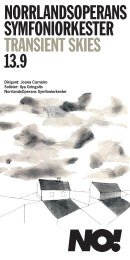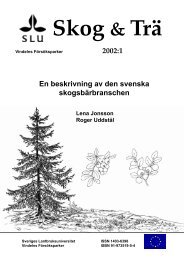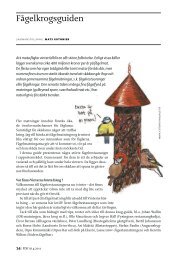Programtidning, Östersjöfestivalen 2008 (pdf) - Sveriges Radio
Programtidning, Östersjöfestivalen 2008 (pdf) - Sveriges Radio
Programtidning, Östersjöfestivalen 2008 (pdf) - Sveriges Radio
Create successful ePaper yourself
Turn your PDF publications into a flip-book with our unique Google optimized e-Paper software.
and timbre. Sinfonietta per archi (1990-91) is<br />
an orchestral version of a string trio, written<br />
for and premiered by Sinfonia Varsovia in 1992.<br />
Karol Szymanowski is Poland’s most<br />
important composer from the beginning of<br />
the 1900s. His Violin Concerto No. 1 (1916) is<br />
an impressionistic tone poem based on the<br />
poem May Night by Tadeusz Micinski, who<br />
shared Szymanowski’s interest in occultism<br />
and mysticism.<br />
Antonín Dvorák wanted to compose<br />
music that spoke to his own countrymen<br />
and described their life on the basis of their<br />
own folk tales and wealth of folk music.<br />
Symphony No. 8 (1890) is like a kaleidoscope<br />
of impressions, ranging from the idyllic<br />
countryside to more dramatic passages.<br />
Wednesday august 27 7.30pm<br />
romantic and anti-romantic<br />
A new work inspired by ice and sea – the<br />
festival’s commission by Klas Torstensson,<br />
framed by Schumann’s beautifully romantic<br />
and attractively expressive melodies.<br />
Klas Torstensson is one of Sweden’s foremost<br />
composers, resident in Holland since 1973.<br />
His most famous work hitherto is the opera<br />
The Expedition, but he has also written<br />
chamber music, orchestral works, songs and<br />
electroacoustic music. The Polar Ocean is the<br />
Baltic Sea Festival’s commission.<br />
Genoveva is Robert Schumann’s only<br />
completed opera. The plot is based on<br />
a popular medieval legend about Count<br />
Siegfried of Brabant and his young wife<br />
Genoveva, who was accused of having<br />
been unfaithful, but was ultimately forgiven.<br />
In 1850 Schumann and his family moved<br />
to Düsseldorf, where he had secured a post<br />
as Civic Director of Music. During a holiday<br />
trip to Cologne the sight of the beautiful<br />
cathedral in the light of the setting sun made<br />
a strong impression on Schumann, and<br />
became the starting point for his Symphony<br />
No. 3, The Rhenish.<br />
Thursday august 28 7.30pm<br />
Longing for far-off places<br />
and for home<br />
Music that communicates a social<br />
commitment and humanist message,<br />
autobiographical music of love, longing and<br />
pain, and a cello’s warm song about longing<br />
for far-off places and for home.<br />
Peteris Vasks is a free-lance composer<br />
resident in Riga, and is deeply involved in<br />
environmental issues. His music is extremely<br />
communicative, and is often about the<br />
relationship between man and nature.<br />
Peter Tchaikovsky composed his own<br />
life. At the time of his Symphony No. 4 he<br />
had just fled his ultra-short and extremely<br />
unhappy attempt at marriage. The ’content’<br />
of the symphony revolves around Fate, the<br />
inevitable, wine-induced inebriation and<br />
exultant joie de vivre.<br />
Antonín Dvorák thought a lot about<br />
musical roots. In mid-career he changed<br />
course and started basing his music on<br />
traditional strains, folk tales and myths. During<br />
his time in the USA Dvorák composed seven<br />
major works, of which the Cello Concerto<br />
(1894-95) is the final piece.<br />
Friday august 29 7.30pm<br />
Vendetta and reconciliation<br />
Richard Strauss’s most expressionist<br />
opera, about irreconcilability and rancorous<br />
vindictiveness, about power games, intrigues<br />
and evil sudden death.<br />
The Austrian poet Hugo von<br />
Hofmannsthal’s play Electra caught the<br />
interest of Richard Strauss, becoming the<br />
start of a long collaboration between the<br />
two of them, resulting in several successful<br />
operas.<br />
The plot<br />
King Agamemnon has been murdered<br />
by his wife Clytemnestra and her lover<br />
Aigisthos, who now lives with the daughters<br />
Chrysotemis and Electra. Chrysotemis tries to<br />
adapt, and wants the sister to cease her bitter<br />
vindictiveness. The mother Clytemnestra<br />
is plagued by nightmares and pangs of<br />
conscience, and seeks Electra’s forgiveness.<br />
Her brother Orestes was sent away after the<br />
murder. Electra hopes he can return and take<br />
revenge on their father’s murderer. The others<br />
think he’s dead. He eventually returns and<br />
murders Clytemnestra and Aigisthos. Electra<br />
triumphs in ecstasy, and drops down dead.<br />
Friday august 29 9pm<br />
in a folk music landscape – the<br />
heritage from the past<br />
The folk hymns contain the deeply existential<br />
experiences we all share – sorrow, joy,<br />
love, power struggles, disappointment and<br />
hope – and the music passes them on from<br />
generation to generation, in ever new settings.<br />
James MacMillan lives in Scotland, where he<br />
teaches half of the time, whilst simultaneously<br />
composing and conducting. His music is<br />
direct and full of feeling, often based on<br />
Scottish folk music and with a spiritual and<br />
political message, and coloured by his own<br />
Catholic faith.<br />
Lasse Thoresen is Professor of<br />
Composition at the Norwegian Academy<br />
of Music, and one of Norway’s leading<br />
composers. His music is based on Norwegian<br />
folk music mixed with spectral music and<br />
other modernist stylistic aids.<br />
Edvard Grieg’s compositional style is<br />
a mixture of the Central European musical<br />
tradition and Norwegian folk music. Choral<br />
singing was an important part of the<br />
Norwegian independence movement in the<br />
19th century.<br />
Four Psalms (1906) was Grieg’s last work.<br />
saturday august 30 7.30pm<br />
nutcrackers, rogues and sinbad<br />
the sailor<br />
Using magic, fantasy and excitement the<br />
Russian folk tale instils children with positive<br />
values, providing solace and hope for a more<br />
just world. The rich sounds of the music give<br />
the tale life, fragrance and colour.<br />
Peter Tchaikovsky was commissioned by the<br />
Director of the Imperial Theatres to write a<br />
new ballet after Sleeping Beauty and Swan<br />
Lake. The theme was to be taken from E. T.<br />
A. Hoffmann’s tale The Nutcracker and The<br />
Mouse King. The story is the imaginative<br />
tale of Clara, who is given a nutcracker for<br />
Christmas. By way of thanks for helping him<br />
in the battle against the Rat King he takes her<br />
to the Kingdom of Sweets.<br />
Rodion Shchedrin was one of the<br />
Soviet era’s most successful and accepted<br />
composers. Naughty Limericks (1963) is his<br />
first concerto for orchestra and is based on<br />
well-known Russian folk melodies and socalled<br />
chastushkas, Russian folk poetry with<br />
“humour, irony and sharp satire… Even such<br />
powerful and feared names as Marx, Lenin<br />
and Stalin were ridiculed in chastushkas,”<br />
says Shchedrin.<br />
Nikolai Rimsky-Korsakov read the<br />
Thousand and One Nights and immediately<br />
envisaged an orchestral suite in four<br />
movements, like “a kaleidoscope of fairy-tale<br />
images and figures of an oriental nature”.<br />
The background is the sly Sheherazade, who<br />
saves her life by telling such exciting stories<br />
that the Sultan has to let her live in order to<br />
hear what comes next.<br />
BiograPHies<br />
Conductors<br />
Daniel Barenboim has collaborated with the<br />
world’s foremost orchestras and musicians<br />
since the 1950s – both as a pianist and as a<br />
conductor. In the course of time Barenboim<br />
has become increasingly involved in peace<br />
issues and projects that contribute to peace<br />
and understanding between people.<br />
Olari Elts won the 2000 Sibelius Competition,<br />
and has since then been Principal Conductor<br />
of the Latvian National Symphony Orchestra,<br />
Artistic Advisor to the Orchestre de Bretagne<br />
and Principal Guest Conductor of the Scottish<br />
Chamber Orchestra and the Estonian National<br />
Symphony Orchestra.<br />
Valery Gergiev is Artistic Director of the<br />
Mariinsky Theatre since 1996, and has done<br />
many highly acclaimed tours with them<br />
throughout the world. Since 2007 Principal<br />
Conductor of the London Symphony<br />
Orchestra, he also guest-conducts some of<br />
the world’s top orchestras, directs festivals<br />
and has received many prizes.<br />
Daniel Harding is Principal Guest Conductor<br />
of the London Symphony Orchestra and<br />
Principal Conductor of the Swedish <strong>Radio</strong><br />
Symphony Orchestra and the Mahler<br />
Chamber Orchestra. He is also one of the<br />
most sought-after guest conductors of<br />
symphony orchestras and opera houses<br />
throughout the world.<br />
Grete Pedersen is equally at home in<br />
baroque, classical, contemporary and folk<br />
music, and often collaborates with jazz<br />
musicians and actors. Since 1990 she has<br />
directed the Norwegian Soloists Choir. She<br />
has worked with prominent a cappella choirs,<br />
and also conducts orchestras.<br />
Krzysztof Penderecki has been one of<br />
Poland’s foremost composers since 1959,<br />
when he won all three prizes in a composition<br />
competition. As a conductor he has enjoyed<br />
international esteem since the 1970s, when he<br />
toured throughout the world and conducted<br />
his own works and those of other composers.<br />
Esa-Pekka Salonen holds a unique position<br />
amongst musicians of today, both as a<br />
conductor and as a composer. Principal<br />
Conductor of the Swedish <strong>Radio</strong> Symphony<br />
Orchestra 1985–95 and the Los Angeles<br />
Philharmonic since 1992, and as from next<br />
season also London’s Philharmonia Orchestra.<br />
Gustaf Sjökvist is cathedral organist at<br />
Storkyrkan in Stockholm, where he conducts<br />
Storkyrkan’s choir and his own chamber<br />
choir. Principal conductor of the <strong>Radio</strong> Choir<br />
1986–1994, and since 1994 Principal Guest<br />
Conductor of the Bavarian <strong>Radio</strong> Choir.<br />
Sjökvist devotes half his time to orchestral<br />
conducting.<br />
30 – östersjöfestivalen <strong>2008</strong> östersjöfestivalen <strong>2008</strong> – 31<br />
soloists<br />
Karolina Blixt mezzo‑soprano, completed<br />
her training at University College of Opera<br />
in Stockholm in <strong>2008</strong>, but made her<br />
breakthrough in the leading role in Handel’s<br />
Xerxes at Drottningholm Court Theatre back<br />
in 2007. She has also sung in Verdi’s Nabucco<br />
and in lieder and church concerts.<br />
Petri Bäckström tenor, made his debut at<br />
Finland National Opera in 2001, where he has<br />
since sung many important character roles.<br />
Since 2003 Bäckström has appeared every<br />
summer at the Opera Festival in Savonlinna.<br />
He has sung with a number of Finnish<br />
orchestras and choirs.<br />
Malena Ernman mezzo‑soprano, is a versatile<br />
artist with a wide musical range. During this<br />
spring, she has been singing the title role in<br />
Rossini’s Cinderella at the Royal Swedish<br />
Opera. Internationally active above all in the<br />
field of baroque opera, with conductors such<br />
as Nikolaus Harnoncourt, René Jacobs and<br />
William Christie.<br />
Larisa Gogolevskaja soprano, was awarded<br />
the 2007 Golden Sofit, St Petersburg’s top<br />
theatre prize, for her interpretation of the role<br />
of Electra. With the Mariinsky Theatre she has<br />
toured to Japan, the USA, France, Slovenia,<br />
Italy and Finland.<br />
Vasily Gorshkov tenor, trained at Novosibirsk’s<br />
Glinka Conservatory in 1992. He<br />
was soloist at the opera in Novosibirsk 1989<br />
and 1996–2000, and made his debut at the<br />
Mariinsky Theatre 1991. Gorshkov became<br />
soloist at the Mariinsky Theatre 1995, as a<br />
permanent member since 2002.<br />
Jakub Haufa violin, born 1980 and graduated<br />
2003 in Poznan, has performed in Poland<br />
and abroad in recitals, chamber concerts and<br />
solo concertos with orchestras. Since 2003<br />
he is the first concertmaster of the Sinfonia<br />
Varsovia.<br />
Dan Karlström tenor, has been employed at<br />
the Schiller Theatre in Gelsenkirchen and the<br />
State Theatre Darmstadt, and since 2002 has<br />
been a permanent member of Leipzig Opera’s<br />
ensemble. He has also performed several<br />
times at the Opera Festival in Savonlinna and<br />
at the Finnish National Opera.<br />
Tuomas Katajala tenor, appeared in The<br />
Journey to Reims at the 2007 Rossini Festival.<br />
Katajala has given concerts throughout<br />
Europe, in Japan and the USA, and with<br />
conductors such as Goodman, Franck, Kamu<br />
and Oramo. He has sung in Savonlinna and<br />
at the Finnish National Opera.<br />
Robert Künzli tenor, started as a baritone<br />
but switched to tenor after his second year<br />
at Munich Opera’s opera studio in the 1970s.<br />
He has been a member of Stuttgart Opera’s<br />
ensemble and has sung in the foremost opera<br />
houses in Europe and in Carnegie Hall.<br />
Mischa Maisky cello, has been one of the<br />
world’s most sought-after cellists since his<br />
debut in London in 1976. He has performed in<br />
concert halls in London, Paris, Berlin, Vienna,<br />
New York and Tokyo. Maisky plays a cello<br />
made by the 18th-century master Domenico<br />
Montagnana.<br />
Jussi Myllys tenor, started his international<br />
career in 2005 with the Turku Opera and<br />
the Comic Opera Berlin, and with concerts<br />
in Prague, Riga and Japan. In 2006 Myllys<br />
became a permanent member of the Frankfurt<br />
Opera, and he has performed in opera houses<br />
such as Berlin, Dresden and Geneva.<br />
Henrik Måwe piano, gave his diploma<br />
concert in spring <strong>2008</strong> with the Royal<br />
Stockholm Philharmonic Orchestra. Other<br />
orchestras Måwe has played with include<br />
Helsingborg Symphony Orchestra and<br />
Västerås Sinfonietta. Måwe has participated<br />
in festivals in France and at the Gotland<br />
Chamber Music Festival.<br />
Elena Nebera soprano, studied at the<br />
St Petersburg Conservatory. She then went<br />
on to Graz Opera School. In 2000 she made<br />
her debut at the Salzburg Festival, and she<br />
currently has a contract with Dortmund<br />
Theatre and has been a guest soloist at the<br />
Mariinsky Theatre since 2006.<br />
Hannu Niemelä bass, has been a member<br />
of the opera houses in Karlsruhe, Mainz and<br />
Dortmund, and made guest performances in<br />
Savonlinna, the USA, Japan, Israel etc.<br />
Berit Opheim soprano, has sung folk music,<br />
jazz, opera and lieder recitals, and has<br />
performed as a soloist with the Oslo Chamber<br />
Choir (tour to the USA), Oslo Chamber<br />
Orchestra, Norwegian <strong>Radio</strong> Orchestra etc.<br />
Esa Ruuttunen baritone, graduated in<br />
theology, then continued his singing studies<br />
whilst simultaneously working as a priest. In<br />
1985 he made his debut at Finnish National<br />
Opera. He has also performed at Covent<br />
Garden, German Opera Berlin etc.<br />
Gabriel Suovanen baritone, is one of the<br />
leading baritones at the Royal Swedish Opera.<br />
He has also sung at the Finnish National<br />
Opera, the Opera Festival in Savonlinna, Liceu<br />
Opera in Barcelona, La Monnaie in Brussels,<br />
Oslo Opera and the Comic Opera Berlin.<br />
Agata Szymczewska violin, born 1985 and<br />
graduated 2004 in Poznan, has won gold<br />
medal at the XIII Henryk Wieniawski Contest<br />
2006 and performed with Sinfonia Varsovia,<br />
Lahti Symphony Orchestra and Seiji Osawa etc.<br />
Eduard Tsanga bass, started his studies at<br />
the Glinka Conservatory in Novgorod in 1998,<br />
and since 2000 he is a soloist at the Mariinsky<br />
Theatre’s Academy for Young Singers.<br />
Elena Vitman mezzo‑soprano, studied<br />
at the St Petersburg Rimsky-Korsakov<br />
Conservatory, and made her debut at the<br />
Mariinsky Theatre in 1996.<br />
ensembles<br />
The Baltic Sea Festival Choir consists of<br />
young, semiprofessional singers from all the<br />
Baltic countries and it endeavours to inspire<br />
interest in professional choral singing in the<br />
next generation of singers.<br />
The Finnish <strong>Radio</strong> Symphony Orchestra<br />
was formed in 1927. In 2003 Sakari Oramo<br />
became its Principal Conductor. The orchestra<br />
has appeared at the BBC Proms, the music<br />
festivals in Bergen, Edinburgh, Schleswig-<br />
Holstein, Vienna, Spain etc.<br />
Helsinki Philharmonic Choir is a symphonic<br />
choir formed in 2007 that seeks high-class<br />
collaboration with various orchestras and<br />
musical institutions, as well as giving its<br />
own concerts. The Artistic Director is Hannu<br />
Norjanen.<br />
The Latvian National Symphony Orchestra<br />
is based in Riga, formed in 1926 and gives<br />
around 60 concerts a year, as well as making<br />
recordings. Performance of new Latvian<br />
music is an important assignment for the<br />
orchestra, which is conducted by the young<br />
Gints Glinka.<br />
The Mariinsky Theatre Orchestra is one<br />
of Russia’s oldest musical institutions,<br />
having been founded in the 18th century.<br />
It was conducted by Tchaikovsky in the first<br />
performance of his Fifth Symphony. Under<br />
Valery Gergiev’s direction the ensemble has<br />
toured abroad and gained great recognition.<br />
Since the 1950s The Swedish <strong>Radio</strong> Choir<br />
has been one of the world’s foremost a<br />
cappella choirs, with a repertoire ranging from<br />
Bach to new music. The choir was formed<br />
in 1925 and achieved world renown under<br />
Eric Ericson. The choir is now directed by<br />
the young Dutchman Peter Dijkstra.<br />
In 1984 the Polish Chamber Orchestra<br />
became Sinfonia Varsovia, and Yehudi<br />
Menuhin was its first guest conductor. The<br />
orchestra has made concert tours in the<br />
USA, Canada and large parts of Europe.<br />
The Swedish <strong>Radio</strong> Symphony Orchestra<br />
was formed in 1965, and under Sergiu<br />
Celibidache’s direction it developed into an<br />
orchestra of international standing, resulting<br />
in successful foreign tours. Since 2007 Daniel<br />
Harding is Principal Conductor.<br />
The West-Eastern Divan Orchestra was<br />
founded in 1999 by Daniel Barenboim<br />
together with the writer Edward W Said, as<br />
a workshop for young musicians from Israel,<br />
Palestine and other countries in the Middle<br />
East, with the aim of encouraging dialogue<br />
between the different cultures.




